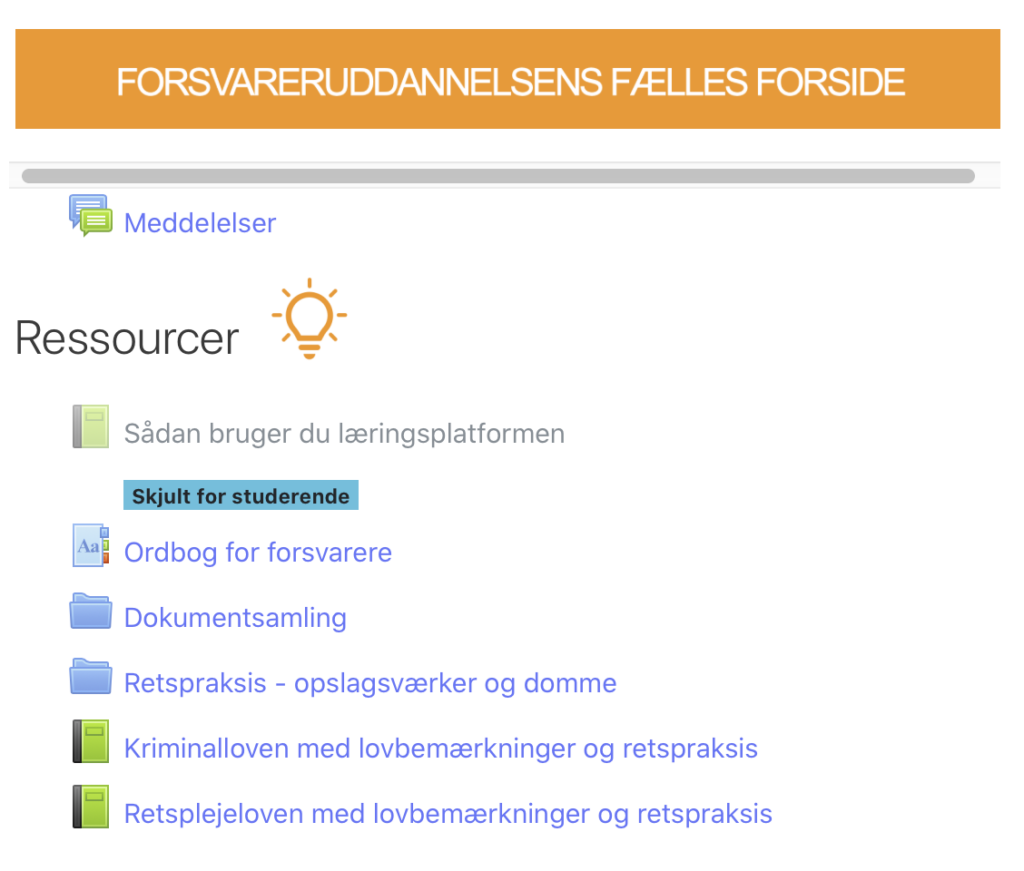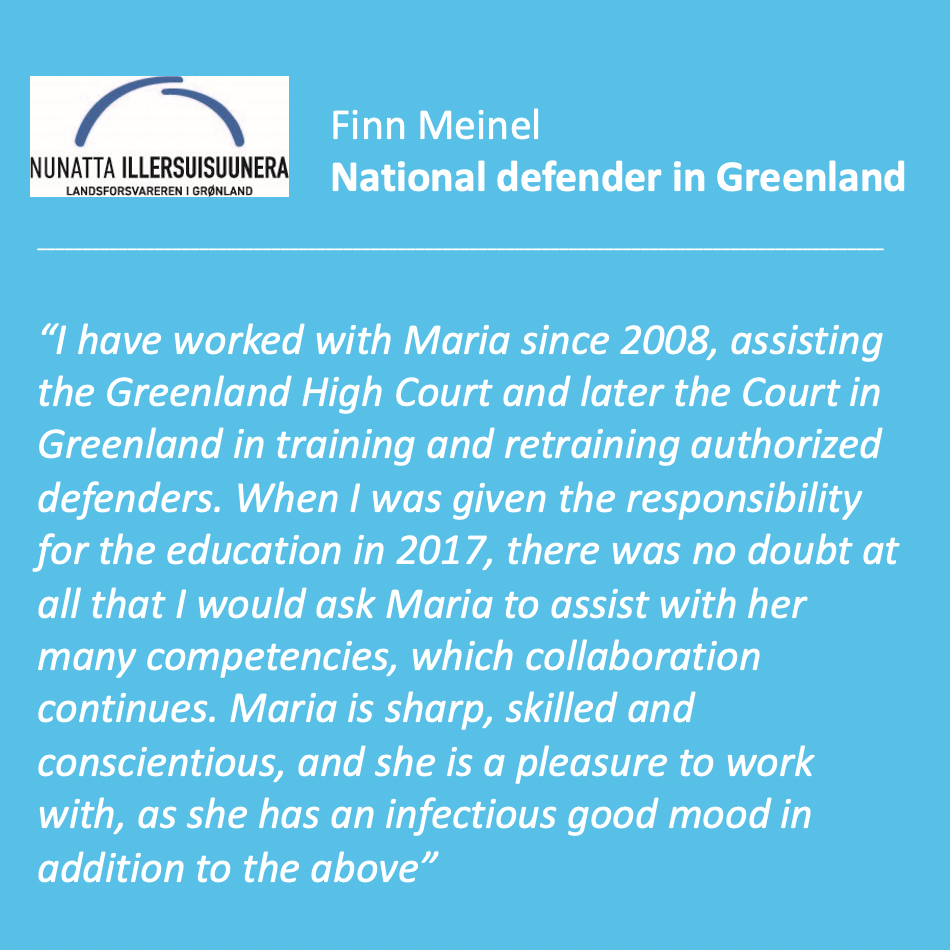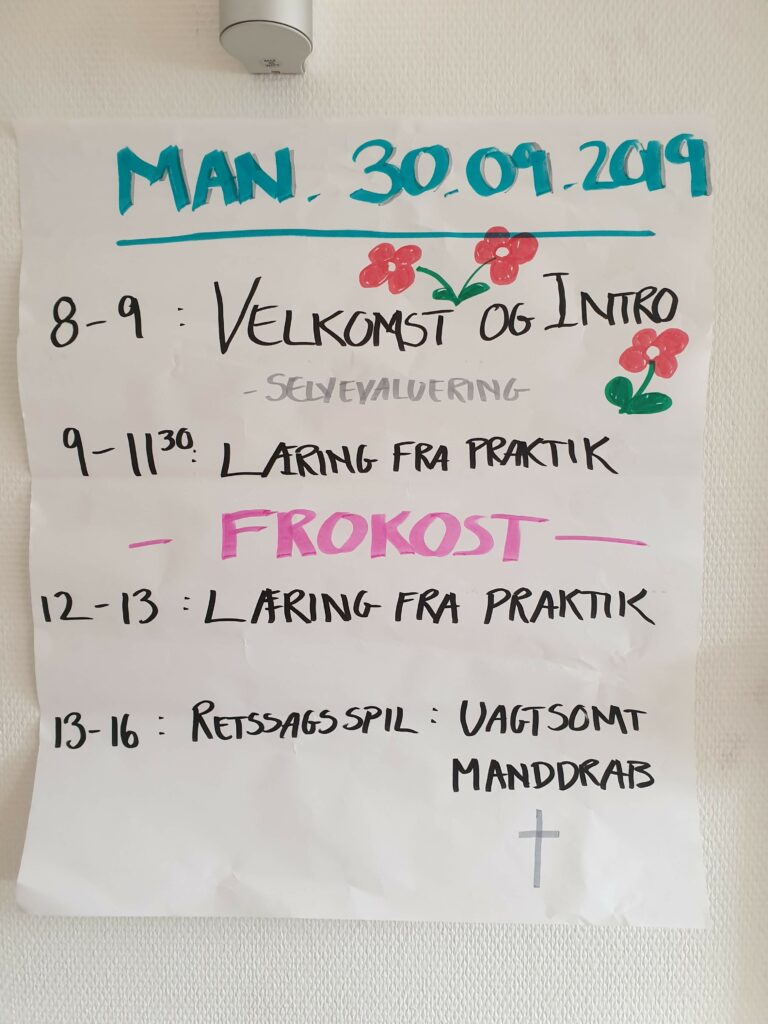It is proud candidates who, after a year of e-learning, courses, and an internship period, passed the final exam and therefor now can become authorized as criminal defenders in the Greenlandic district courts. There is a good reason for this, because it is not an easy task they have been on.
Because in Greenland, criminal defenders, as well as judges and prosecutors at the district courts do not have a law degree. Instead, they have undergone a special targeted education organized in Greenland, through which they learn about the relevant theory and training of the necessary practical skills to carry out their roles. The candidates must learn about the special Greenlandic legal system and the rules for the processing of criminal cases, how to identify the central themes in a case, as well as how to carry out client meetings and lead their cases with respect for the client’s wishes and interests.
Another challenge the defense candidates face is that the education is not a full-time study, but an education that the candidates follow alongside their main job or study. This means that the candidates must juggle requirements from their main occupation and study at the same time and e.g. take time off to attend courses. The graduates live scattered throughout Greenland, as they do not move from their main occupation to participate in the education. But it cannot really be any different way when the defense profession is basically thought of as a side job next to a main profession.
A third and fourth challenge is that the education is unpaid and requires special language skills. While the teaching mainly is in Danish, the internships that the candidates must conduct along the way, mainly is in Greenlandic. Like all other educations and jobs in Greenland, this education also has the challenge of being in sharp competition with other educations and jobs. With a small population in a large country with many functions to cover, there is a rift over the candidates from jobs and educations, and it is a constant struggle to retain the chosen candidates from the beginning of the education to its completion.
LEARN|RIGHT supports the National Defender in Greenland with the development and implementation of a one-year blended learning education of criminal defenders with the purpose of enabling the candidates to provide their clients with the best possible defense in criminal cases as well as to contribute to ensuring a well-functioning judicial system and the right to a fair trial in Greenland. Along the way, we have contributed to the recruitment process and the development of the curriculum, the establishment of an online learning platform with weekly e-learning subjects, facilitation of monthly video conferences, and five attendance courses and exams.
Blended & flipped learning
LEARN|RIGHTs Maria Løkke Rasmussen has been a pedagogical advisor for the education of Greenlandic criminal defenders since the education began in 2007 and in all the years, the education’s special framework and conditions have been a challenge that the planning and implementation of the education has had to deal with. In 2017 however, new opportunities arose when the Danish Ministry of Justice finally appointed a national defender in Greenland with the education of criminal defenders as one of his special areas of responsibility, and at the same time an executive order was issued for the education, with the long-desired framework for the education.
Together with the national defender, we then chose to organize the education of criminal defenders as a blended learning education, which could meet some of the education’s challenges. The education was thus structured as five attendance courses, which the candidates travel to from all over the coasts of Greenland, as well as weekly e-learning subjects, which the candidates can complete from home at their own pace and at times that fit into their everyday lives.
The structure of the education has also made it possible to use flipped learning, where the knowledge components of the education were primarily reviewed through the e-learning subjects before the courses, which freed up precious time during the courses for role play and other interactive exercises, discussions, and questions that help strengthen understanding and practical skills of the candidates.
The blended learning approach contributes with a necessary flexibility in the education and expands the learning space in time and space. Every week – except for the summer holidays and course weeks – the candidates have completed an e-learning subject based on the curriculum’s focus areas built around text and videos, as well as reflections, discussions, and self-correcting multiple-choice assignments. Occasionally, e-learning has had more extensive hand-in exercises such as written closing statements for fictive criminal cases. We developed as many as 35 e-learning subjects, divided into 1-2 subjects per week with the assistance of the national defender and other lawyers, with titles such as “The Client Meeting”, “The Right to a Fair Trial” and subjects about relevant forms of crimes. Thus, we have been able to offer more education than with the courses alone, we have been able to spread the education out over a longer continuous course and we have created an interactive basic textbook for the candidates, which they can return to again and again.



Strengthen educational framework and contact with the candidates
It has been a positive surprise how well the online learning platform has worked as a unifying factor for an education spread over time and place. The online learning platform has contributed with an overview and a common thread by gathering all information and communication regarding both e-learning, courses, the internship period, and exams in one place. It has truly been a virtual classroom where candidates and the team behind the education have been able to tap in and be present together, regardless of where and when others were logged on.
The candidates have been able to follow each other’s progression and answers, and they have greatly appreciated the ongoing feedback on assignments and the helping hand from us at the other end, and we have done our best to cheer on and motivate them along the way. Within the team behind the education, we have been able to continuously follow the candidates’ progress in e-learning from Denmark and Greenland and e.g., also been able to see when the candidates were appointed to and finished the 10 cases, they were to conduct during their internship period.
The weekly summaries of the candidates’ work with the e-learning subjects have helped to drive the education forward and tie an otherwise very individual education together. At the end of each week, the candidates have written down what they have learned during the week and given feedback on the e-learning subjects. Subsequently, as co-organizers, we have collected essential points from the week’s subjects and what the candidates found difficult and introduced the following week.

Broken sea-cables and language challenges
The distribution of sea-cables and flat-rate internet in Greenland has made e-learning a far more attractive means of learning in a country where great distances between cities makes face-to-face learning cumbersome and expensive. But it has not been without problems. Along the way, several breaches of Greenland’s sea-cable supplying the internet traffic made the learning platform either slow or unavailable to the candidates in the affected areas. It sometimes delayed their work on the platform and at one point it transformed the e-learning into a letter course with content and assignments sent back and forth over e-mail. But the learning platform continued to provide a good framework and backbone for the education, which the candidates returned to when it was possible.
Another challenge has been how to assist the candidates in carrying out their legal cases in Greenlandic. In Greenland the legal language is both Danish and Greenlandic and while most documents are presented in Danish, most cases in are conducted in Greenlandic in the district courts. The candidates are bilingual, but that does not necessarily mean that they know the terminology used in court. To reinforce that, in an education with primarily Danish-speaking teachers and developers, we created a version of the Code of Criminal Procedure and the Criminal Code where the provisions are found side by side in the two languages. Also, we developed a series of videos in Greenlandic and held role plays in Greenlandic with interpretation. In addition, the candidates have submitted several written closing statements in Greenlandic on the learning platform. What the candidates have most appreciated in this regard, however, have been videos of closing statements in Greenlandic presented by experienced defenders, on case descriptions, to which the candidates themselves have previously submitted their own closing statements.

Blended learning in the future
With so much material developed on the learning platform through the first education we developed, it has been easy to build on the learning platform for subsequent educations with the national defender. Thus, we look forward to reusing the learning platform in future educations of criminal defenders so that we can say congratulations to even more blended-learning-educated criminal defenders.
At the same time, we have ensured that the “old” authorized criminal defenders also can benefit from the overall knowledge and activities, by further developing the e-learning subjects into a knowledge bank where they can look up subjects as needed, just as it is used for shared knowledge sharing, and as a part of the ongoing training and after work meetings for authorized criminal defenders in Greenland.
Finally, the learning platform is also the backbone of the abbreviated education for candidates with special prerequisites, which ties their attendance course and internship period together and gives them access to a lot of tools along the way.
